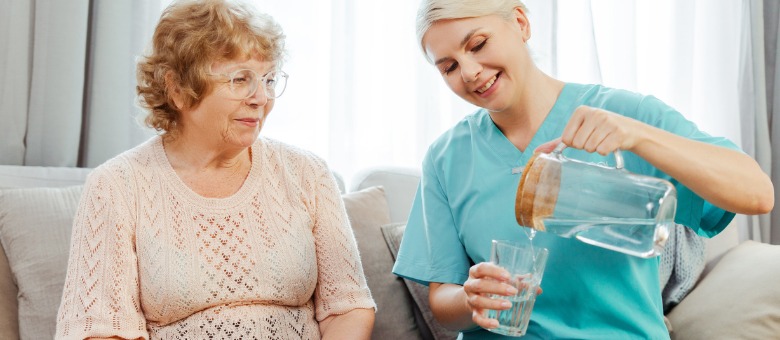
Why Hydration Matters for Seniors: Tips to Stay Healthy
Between the unpredictable weather and the summer heat in the Oklahoma City region, older seniors and their caregivers in these parts need to be especially aware of maintaining a balanced system. The adult human body is composed of roughly 60% water. So, it should come as no surprise that drinking enough water (but not too much!) is key to maintaining optimal health – particularly as you get older.
Whether you want to help an aging loved one stay properly hydrated or are merely curious, take a look at the advice below to learn more about strategies that work with aging populations.
The Importance of Hydration for Older Adults
Staying adequately hydrated is essential at any age. But as we age, our ability to know when it’s time to take a drink and replenish our system with some fresh H2O diminishes. Unfortunately, 40% of older adults do not consume enough fluids, and studies show that over one in four of them are chronically dehydrated, which can lead to a host of issues and health complications.
Therefore, seniors sometimes require a little extra guidance to ensure they drink the recommended six to eight cups of water a day. Staying consistently hydrated is always important for staying healthy, as it is key to maintaining bodily functions. Proper hydration does quite a few good things for the body, which only become more vital the older you get:
- Helps with joint function
- Supports cognitive functioning
- Improves overall mobility
- Enables organs to function
- Enhances digestive health
Furthermore, consuming enough fluids reduces the risk of blood clots, heat exhaustion, and other serious health issues you definitely want to avoid.
Understanding Dehydration in Seniors
Older adults are more prone to dehydration than younger people for a few reasons. The one that may be least understood is their reduced capacity for detecting thirst. But there are other factors to know about that can impact whether the older person in your life is able to stay hydrated:
- Cognitive issues like dementia can cause someone to forget to drink
- Dehydration due to medications
- Lack of mobility, making it more difficult for older adults to access water
- Fear or embarrassment of incontinence
- Swallowing difficulties, such as dysphagia
Seniors, family members, and caregivers must all be on the lookout for signs of chronic dehydration. Paying attention to these signs helps ensure an elderly person can quickly address the issue before it leads to more serious problems. Some of the top symptoms of chronic dehydration in seniors include:
- Dry, flaky, or itchy skin
- Discolored, dark urine
- Kidney problems such as kidney stones
- Fatigue
- A dry throat or mouth
- Trouble focusing
- Constipation
If you or your elderly loved one is experiencing one or more of these issues, and there’s a chance it is due to dehydration, have the person consume fluid immediately to see if it helps resolve the problem. It is also advisable to book an appointment with your healthcare provider if there are signs of serious health issues like kidney problems.
3 Tips for Southwest OKC Seniors to Drink More Water
If you are caring for an older senior, there’s already a lot to think about. But assisting with hydration doesn’t have to be complicated or time-consuming if it becomes a daily habit. To make the task less stressful for you and easier on the person in your care, follow these three tips for maintaining a healthy level of hydration throughout the day.
- Drink Fluids You Like: Whether you prefer filtered, sparkling, seltzer, or distilled water, choosing water you like will make you more likely to drink it. While regular water may taste bland on its own for some, you can add lemons, limes, or cucumbers to enhance the flavor.
- Make Drinking Water Part of Your Daily Routine: Keep a water bottle right by your bed and get into the habit of taking a sip first thing in the morning. Purchase a water pitcher to keep filtered water on tap all day, every day.
- Eat Fluid-Rich Foods: Seniors can boost their daily hydration by eating fluid-rich foods. Fruits and vegetables, such as apples, peppers, tomatoes, cucumbers, watermelon, and berries, are all a good place to start.
Visiting Angels Southwest OKC Help Seniors Stay Hydrated
Visiting Angels of Southwest OKC makes it easier for older adults to stay hydrated – and that’s just one of many ways that our caregivers help people live independent, balanced lives. An in-home caregiver can monitor for signs of chronic dehydration, remind seniors to drink water, and prepare meals with water-rich ingredients.
Contact us today for more information on how we can help you stay hydrated, happy, and healthy.
